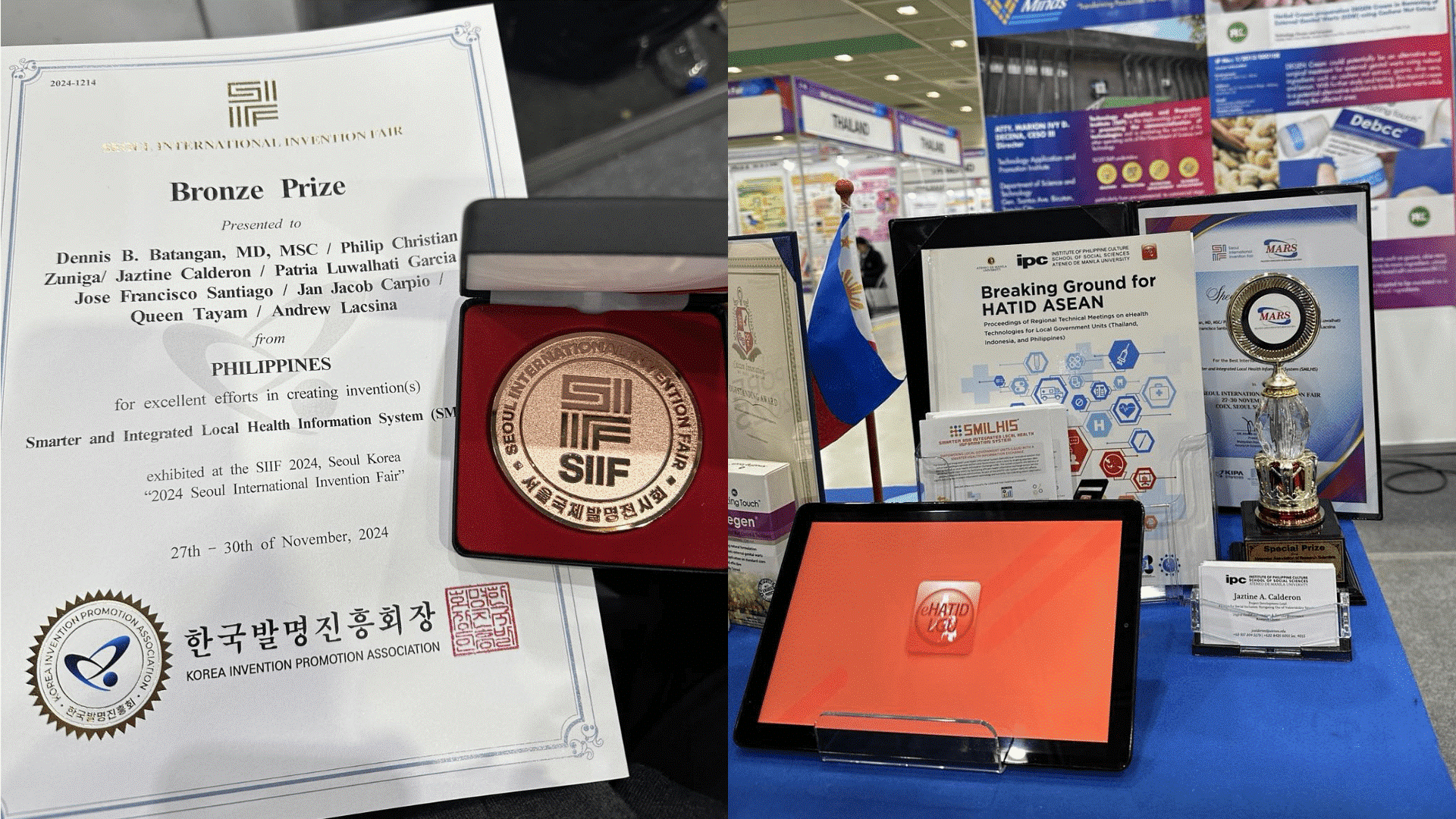NEWS AND UPDATES
Smarter and Integrated Local Health Information System Project Team’s eHATID LGU wins Bronze Medal and Special Prize at Seoul International Invention Fair

The Smarter and Integrated Local Health Information System’s (SMILHIS) eHATID LGU project received global recognition as a Bronze Medalist from the Korea Invention Promotion Association (KIPA) and Special Prize for Best International from the Malaysian Association of Research Scientists during the 2024 Seoul International Invention Fair (SIIF) on November 27-30, 2024. Known as one of the premier gatherings of inventors worldwide, the SIIF showcases science and technology (S&T) solutions addressing societal concerns through technology and innovation. With over 500 entries from 30 countries, the recognition of eHATID LGU highlights its potential to provide healthcare in underserved and isolated communities.
Developed to manage the concerns of healthcare workers especially in rural communities, the eHATID LGU functions as an offline-accessible electronic medical records platform. It enables local health units to store and update patients’ data efficiently, even in areas where internet access is unreliable. The project also facilitates reporting to national agencies like PhilHealth, helping to streamline administrative tasks while freeing up more time for patient care.
Mr. Jaztine Calderon, the developer of eHATID LGU, shared the inspiration behind the project, stating, “The goal has always been to address the practical difficulties encountered by healthcare workers in remote areas. Many rely on paper-based records that are prone to errors and delays. With eHATID LGU, data can be managed efficiently, even without an internet connection.”
The system operates on mobile devices such as smartphones and tablets, offering healthcare providers an accessible and intuitive tool. To complement its functionality, Calderon and his team also introduced the SMILHIS Local Health Information Exchange (LHIE). The additional platform securely integrates patient records across multiple health facilities, ensuring continuity of care when patients visit different clinics or hospitals. The eHATID LGU and LHIE can serve as innovative solutions for health data management in geographically isolated and underserved communities.

The Department of Science and Technology – Philippine Council for Health Research and Development (DOST-PCHRD) played an important part in the project’s success. Through funding and monitoring, the DOST-PCHRD has supported the advancement and wider adoption of eHATID LGU. Calderon expressed gratitude for the support, saying, “The involvement of government organizations like DOST-PCHRD provides Filipino innovators with the resources and opportunities needed to share their work on an international stage.” Through the Council’s guidance, the project has been aligned with national health priorities, ensuring its relevance and responsiveness to the needs of communities across the Country.
DOST-PCHRD Executive Director Dr. Jaime C. Montoya commended the project, saying, “The eHATID LGU exemplifies how research and development and technological prowess can improve access to quality healthcare for Filipinos. The project’s recognition on the international stage highlights the ingenuity and dedication of Filipino innovators in making healthcare accessible for all.”
Looking ahead, the eHATID LGU team aims to expand the system’s applications beyond healthcare further. Plans are underway to explore its use in public service sectors such as disaster risk reduction management and social welfare. Through integrating various functions, Calderon’s team seeks to establish a comprehensive platform that addresses a broader range of community needs.
Reflecting on the recognition at SIIF, Calderon remarked, “The real indicator of success lies in creating solutions that respond with the needs of communities. It is an honor to have eHATID LGU acknowledged globally, but the greatest achievement remains its impact on the lives of those it serves.”
Three other Filipino projects also won Bronze Medals at the SIIF: the iPOND device developed by Ms. Zalda R. Gayahan of DOST – Metals Industry Research and Development Center (MIRDC), the Bamboo Textile Fiber Technology spearheaded by Ms. Marie Antonette V. Berces of DOST – Philippine Textile Research Institute (PTRI), and the DeBCC Cream for basal cell carcinoma treatment invented by Ms. Lorena B. Dela Cruz-Chiu.




